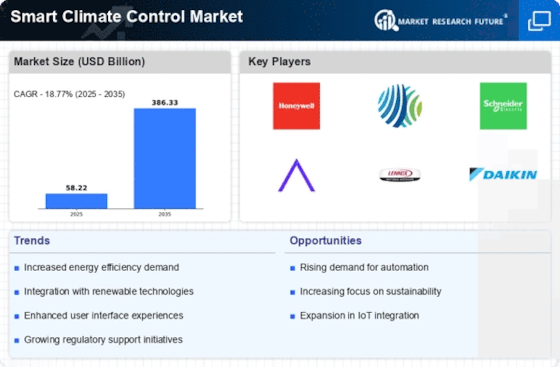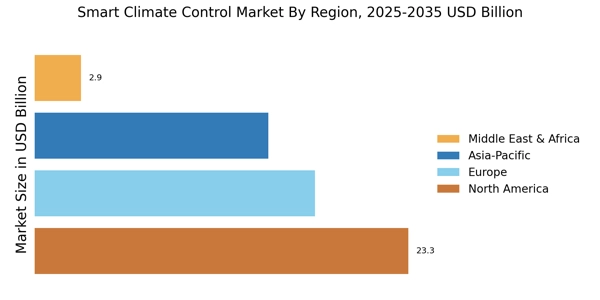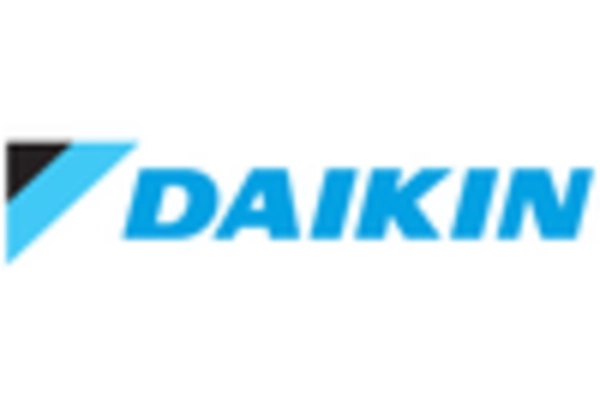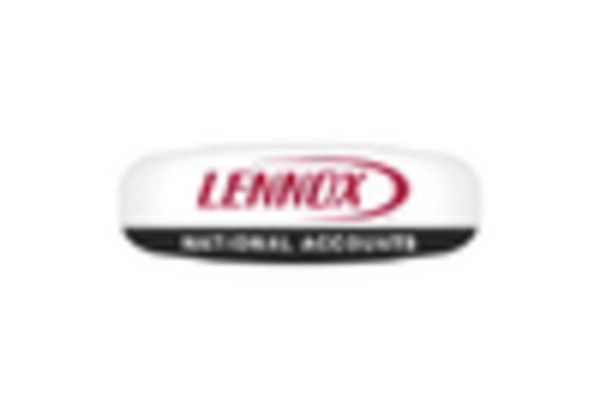Rise of Smart Home Integration
The rise of smart home integration is significantly influencing the Smart Climate Control Market. As more households adopt smart home technologies, the demand for climate control systems that can seamlessly integrate with other smart devices is increasing. This trend is supported by data indicating that the smart home market is expected to grow at a compound annual growth rate of over 25% through 2025. Consumers are increasingly seeking solutions that offer convenience, such as remote access and automation, which smart climate control systems provide. This integration not only enhances user experience but also promotes energy efficiency, making it a key driver for market expansion.
Technological Advancements in IoT
The Smart Climate Control Market is experiencing a surge in technological advancements, particularly in the Internet of Things (IoT). The integration of IoT devices allows for real-time monitoring and control of climate systems, enhancing user experience and energy efficiency. According to recent data, the IoT market is projected to reach a valuation of over 1 trillion dollars by 2025, indicating a robust growth trajectory. This proliferation of connected devices enables seamless communication between various climate control systems, leading to optimized performance and reduced energy consumption. As consumers increasingly seek convenience and efficiency, the demand for smart climate control solutions is likely to rise, further propelling the market forward.
Government Incentives and Regulations
Government incentives and regulations play a crucial role in shaping the Smart Climate Control Market. Many governments are implementing policies aimed at reducing carbon emissions and promoting energy efficiency. For instance, tax credits and rebates for energy-efficient home upgrades encourage consumers to invest in smart climate control technologies. Additionally, regulations mandating energy efficiency standards for appliances are driving manufacturers to innovate and comply with these requirements. As a result, the market is likely to witness an influx of advanced climate control solutions that meet regulatory standards, thereby enhancing overall market growth and consumer adoption.
Increased Focus on Health and Comfort
An increased focus on health and comfort is emerging as a significant driver in the Smart Climate Control Market. Consumers are becoming more aware of the impact of indoor air quality on health and well-being. Smart climate control systems that offer features such as air purification and humidity control are gaining traction as they contribute to a healthier living environment. Research indicates that improved indoor air quality can enhance productivity and overall health, which is appealing to both residential and commercial sectors. As the demand for healthier living spaces grows, manufacturers are likely to innovate and expand their offerings in the smart climate control domain, thereby driving market growth.
Growing Consumer Awareness of Energy Efficiency
Consumer awareness regarding energy efficiency is a pivotal driver in the Smart Climate Control Market. As individuals become more informed about the environmental impact of energy consumption, there is a noticeable shift towards adopting energy-efficient solutions. Reports suggest that energy-efficient products can reduce energy usage by up to 30%, which is appealing to both environmentally conscious consumers and those looking to lower utility bills. This heightened awareness is fostering a demand for smart climate control systems that not only provide comfort but also contribute to sustainability goals. Consequently, manufacturers are increasingly focusing on developing products that align with these consumer preferences, thereby stimulating market growth.

















